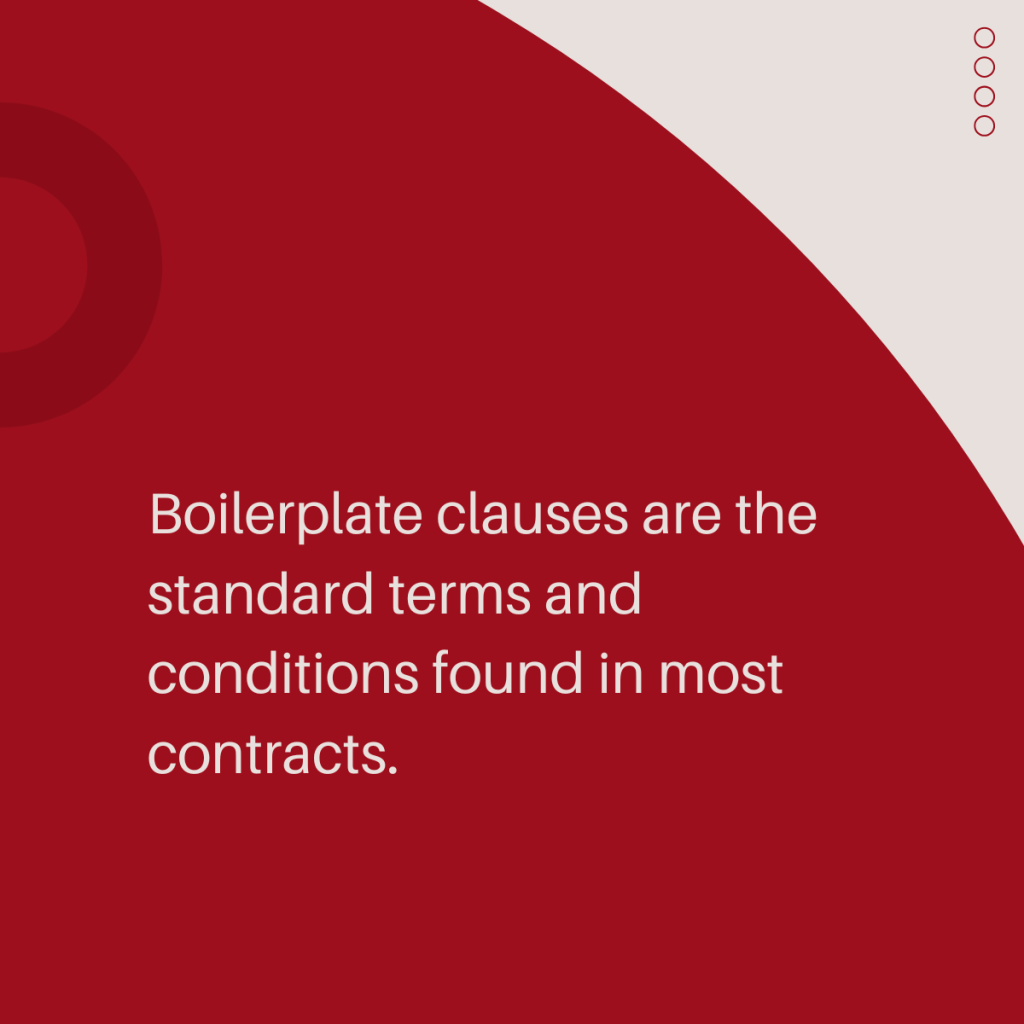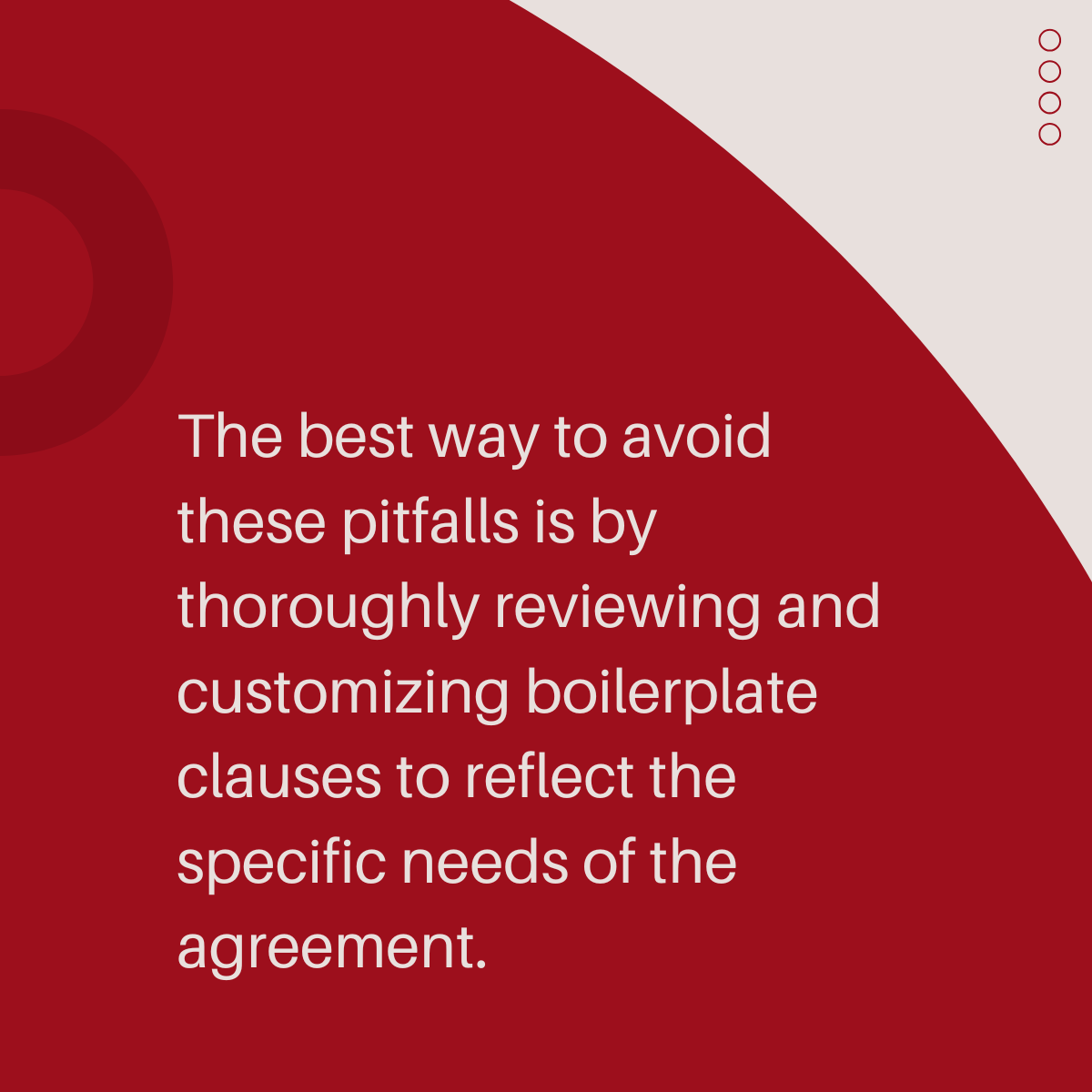
Using Boilerplate Clauses and Its Risks
*THE INFORMATION INCLUDED IN THIS BLOG POST IS FOR INFORMATIONAL PURPOSES ONLY AND DOES NOT CONSTITUTE ADVERTISING, A SOLICITATION, OR LEGAL ADVICE, AND SHOULD NOT REPLACE YOUR CONSULTATION WITH A LAWYER CONCERNING YOUR PARTICULAR NEEDS*
Contracts are the backbone of business and real estate transactions, setting the rules and expectations for all parties involved. Yet, boilerplate clauses are often overlooked within most agreements. Boilerplate clauses are standardized and pre-written sections that come with risks when they’re not tailored to the specifics of a deal.
So, what exactly are boilerplate clauses, and why should you pay attention to them? Whether you’re signing a purchase agreement, service agreement, contractor agreement, partnership agreement, real estate lease, or any other agreement, understanding the meaning and implications of boilerplate language can make the difference between a smooth deal and a costly dispute.
What Are Boilerplate Clauses and Agreements?
Boilerplate clauses are the standard terms and conditions found in most contracts. They handle general but important matters, for instance, which state’s laws apply if there’s a dispute, how conflicts will be resolved, or what happens if part of the contract is invalid. These clauses are generally reused across different agreements, making them a quick and convenient way to address legal basics.
A boilerplate agreement is a contract that relies heavily on these pre-written sections without much customization. While this approach can save time and money, it might not cover the unique details or risks of a specific deal. For example, a generic clause about liability might leave one party unfairly exposed because it wasn’t tailored to the situation.
Boilerplate clauses might seem like small details, but they can have a big impact. Understanding and customizing legal documents can protect your interests and avoid unnecessary risks.

Common Boilerplate Clauses and Their Purpose
Boilerplate clauses cover a wide range of standard legal provisions. Here are some common examples and their functions:
1. Governing Law and Jurisdiction
- Specifies which state’s laws will apply in case of a dispute and where legal proceedings will take place.
- Purpose: Ensures clarity on legal processes, especially in multi-state agreements.
2. Force Majeure
- Relieves parties from liability, either permanently or temporarily, if they are unable to fulfill obligations due to events beyond their control, such as natural disasters or pandemics.
- Purpose: Protects against unforeseen circumstances that make performance impossible.
3. Indemnification Clauses
- Requires one party to compensate the other for specific losses or damages caused during the agreement.
- Purpose: Clearly defines financial responsibility for potential risks.
4. Severability Clause
- States that if one part of the contract is found invalid, the rest of the agreement remains enforceable.
- Purpose: Prevents a single issue from voiding the entire contract.
5. Amendment and Waiver Clauses
- Outlines how changes to the agreement can be made and ensures no terms are waived without written consent.
- Purpose: Provides a process for updates while maintaining the integrity of the original contract.
6. Assignment Clause
- Regulates whether one and/or more parties can transfer their rights or obligations under the contract to someone else.
- Purpose: Protects parties from unexpected changes in who they’re dealing with.
7. Warranties
- Promises or assurances made by either or both parties regarding the performance of contract obligations.
- Purpose: Provides clear expectations and accountability for both parties.
8. Confidentiality
- Aims to ensure that certain information shared during the agreement will remain private.
- Purpose: Protects sensitive information from being disclosed.
9. Limitations on Damages
- Sets a cap or restricts the types of damages that may be awarded in a dispute.
- Purpose: Prevents excessive liability for a party to the agreement.
10. Arbitration Clause
- Requires disputes to be resolved through arbitration rather than in, or before, court.
- Purpose: Offers a faster, private alternative to lawsuits.
11. Notice Clause
- Specifies how and when parties must notify each other about issues or updates under the agreement.
- Purpose: Ensures proper communication between the parties.
12. Integration Clause
- States that the written contract is the complete and final agreement between the parties.
- Purpose: Prevents disputes over prior verbal agreements or understandings.
13. Attorneys’ Fees and Costs
- Allocates responsibility for legal fees if a dispute arises.
- Purpose: Clarifies whether each party covers their own costs or if the losing party is obligated to pay the legal fees of the prevailing party.

Source: Freepik
The Risks of Relying on Boilerplate Clauses
Lack of Customization
Boilerplate language often fails to address the unique aspects of a specific agreement. For example, a lease agreement using boilerplate indemnity clauses might not account for risks unique to a particular property, leaving parties exposed to unintended liabilities.
Ambiguity and Misinterpretation
Generic wording can create room for misinterpretation, especially when the language is outdated or doesn’t align with the intent of the parties. Disputes often arise when clauses are too vague or don’t address specific scenarios.
Conflicting Terms
Boilerplate clauses can sometimes contradict custom provisions in the same contract. For instance, a standard governing law clause might conflict with unique dispute resolution terms, leading to confusion over which rules apply.
Unenforceable Provisions
Laws vary by jurisdiction, and some boilerplate language might not comply with local legal requirements. For example, a clause that imposes excessive penalties for breach of contract could be ruled unenforceable in certain states.
Overlooking Key Details
When relying too heavily on boilerplate language, important nuances may be missed. For instance, a force majeure clause might not include all relevant events, such as cyberattacks, which are increasingly common in today’s business landscape.
The best way to avoid these pitfalls is by thoroughly reviewing and customizing boilerplate clauses to reflect the specific needs of the agreement. Engaging legal counsel can ensure that these provisions are clear, enforceable, and aligned with the goals of all parties.
Avoiding Risks with Boilerplate Clauses: How DMAB Can Help
Whether you’re drafting a purchase agreement, service agreement, contractor agreement, partnership agreement, lease, or any other agreement, it is imperative that the clauses in these agreements reflect the specific needs of your transaction. Here’s how you can proceed effectively and how DMAB can support you.
1. Tailor Clauses to Your Agreement
Customizing contracts ensures that terms like indemnity, force majeure, and governing law align with the specific risks and goals of your agreement. Our lawyers can work with you to adapt standard clauses to fit your needs, protecting your interests without compromising efficiency.
2. Ensure Legal Compliance
Boilerplate clauses are often reused without regard for local legal requirements, which can result in unenforceable provisions. Our team at DMAB will work with you to tailor your contracts to comply with applicable laws to minimize the risk of legal challenges.
3. Review for Clarity and Consistency
Ambiguities or conflicting terms can undermine even the most carefully drafted contracts. DMAB conducts thorough reviews so that your boilerplate clauses are clear, consistent, and do not contradict other provisions.
4. Future-Proof Your Agreements
Laws and market conditions change, and outdated language can create vulnerabilities. By working with DMAB, you can keep your contracts updated and relevant, safeguarding your business or real estate transactions.

Contact us Today
Let DMAB ensure your agreements are tailored to your needs, clear, and legally sound. Contact us today to schedule a consultation. Our experienced lawyers can assist you in preparing the agreements that you need, and help protect your business or real estate interests.
